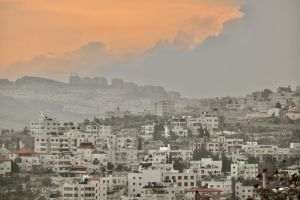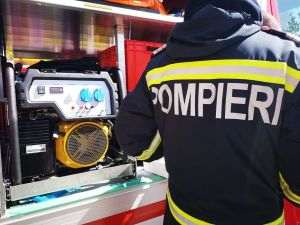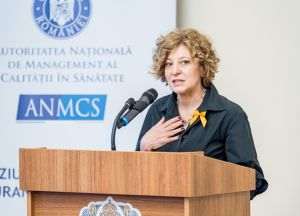The current challenges facing the European Union will only be overcome if decision-makers in Brussels and citizens of the member states truly understand its cultural heritage, the interconnections between European nations and the democratic values that underpinned the establishment of this supra-state structure, said participants last Friday at the "In the Heart of Europe" conference, organized in Bucharest by the International Pan-European Union, in collaboration with Pan-Europa Romania and the "Carol I" Central University Library.
Opening the event, Mirelle Rădoi, general director of the cultural institution that hosted the conference, said: "The mission of the Central University Library is to facilitate access to education and to create an intercultural environment, which represents the center of the European Union. From this perspective, Europe is not just a geopolitical construction, but a community of values, a constant project that, for each of us, has a future. Every page we turn, every value we share, every step we take in the education process represent key elements that contribute to the development of European ideas. Following the steps taken by great personalities to understand the importance of education and access to knowledge, we have a duty for these central values to create bridges between the past and the present in order to draw a future that we want. Unfortunately, Europe is not going through a comfortable moment, being ground by tensions and conflicts, economic crisis and a worrying trend of demographic decline, which is offset by strong migration".
Former Minister of Finance in the Cîţu government, Alexandru Nazare - president of Pan-Europa Romania - stated that Romanians have been pro-European for almost 100 years.
Alexandru Nazare stated: "If you ask any Romanian, they will tell you that our history in the European Union began with the accession of our country on January 1, 2007. Seriously? Our history regarding the European Union began in 1926, when Prince Leon Ghika published the work "Towards Pan-Europe" and participated in the first Pan-European congress, which took place in the same year in Vienna (ed. - 2000 representatives from 24 European countries participated in the first congress). Why? Because he wanted to build around this idea. We were present at all the Pan-European conferences (seven conferences) that took place until the outbreak of World War II, through Nicolae Titulescu, Grigore Gafencu, Dimitrie Gusti, the last being the one who had the idea of organizing a Pan-European conference in Bucharest. We, Romanians, fought for the idea of European unity, we were Europeans many years before being part of the European Union. We were present all the time at the discussions regarding the European Union, even when the foundations of the current structure were laid. In 1955, I participated, through Grigore Gafencu, in the first decision regarding the choice of a European anthem - "Ode to Joy" - when the European Union did not yet exist (ed. - The European Economic Community was established on March 25, 1957, and the anthem "Ode to Joy" was officially adopted as the European anthem in 1972). And Gafencu agreed with this anthem. (...) We are back in Europe, we are in the European Union, we will stay here, we are creative, we are practical and we want to bring important, beneficial changes in many areas. Education, culture, religion, sharing knowledge have united European nations. Let's not talk about skills, which define national systems. Foreign policy, defense, economic spending are common things that do not give us any purpose, but they ensure that we do not lose, that we will not be erased from history and that we have gained all our power by sharing the same values, and this has been happening for over 100 years."
• Pavo Barisic: "EU - the only world power born from the idea of peace"
Alain Terrenoire, President of the International Pan-European Union, recalled the challenges currently facing the European continent and said: "This is the moment when we need European unity, of European countries and citizens, a unity that represents the true power that ensures the independence and sovereignty of the entire European Union, which is the main objective of this political-economic-social construction. Therefore, we must react quickly to the challenges we face: the aggression illegally launched by the Russian Federation in Ukraine, the threats in international trade, the military egoism of the US and the call for deglobalization."
The President of the International Pan-European Union showed that, under current conditions, there is a need to increase military spending, but also massive investments for the EU's economic growth, which will bring well-being to European citizens, in a world marked by competitiveness.
Alain Terrenoire also stated: "Globalism represents an opportunity for the EU, which must act as a true strong actor, with well-defined goals both in foreign policy and in trade relations with the states of Asia and Africa".
In turn, Pavo Barisic, Secretary General of the International Pan-European Union, former Minister of Education in Croatia, candidate for the presidency of the Pan-European movement, said that the European Union is the only world power, which unlike the others - the USA, Russia and China - was born from the idea of peace.
Pavo Barisic stated: "The Pan-European idea dates back over 100 years and is current in what it proposes regarding the future of the European Union. This conference gives me the opportunity to emphasize once again the ideas of the founder of Pan-Europe, Count Ruchard von Coudenhove Kalergi, who, after the First World War, laid the foundations of the modern European Union with the ideas of Pan-Europe. As early as 1922, Kalergi wrote about a Europe of peace, a Europe without borders, a single European currency, a common army and a common foreign and security policy. The concept of freedom is closely linked to European identity. And today we are fighting for that freedom, by defending Ukraine. The European Union is founded on freedom and peace, and this is our constant. A hundred years ago, the EU existed only in the vision of the pan-European movement. In the meantime, the EU has been established and has become a respectable world power, which is different from the other four superpowers because it is the only one that was born from the idea of peace. If we continue to imagine and position Europe as a bearer of peace, we will have a good future.
• Teodor Paleologu: "If we allow politicians to discredit democracy, then democracy will collapse"
Teodor Paleologu, former Minister of Culture in the first Boc government and former ambassador of our country to Denmark and Iceland, drew attention to the fact that the European Union has turned into an institution of technocrats and politicians in power, forgetting about its cultural heritage.
Teodor Paleologu stated: "I believe that defining Europe as a movement is related to specifying its heritage. You have chosen as the title of this conference "In the Heart of Europe". If we want a Europe of technocrats, it does not mean that we will have a Europe with intellectuals. If Europe remains only the business of technocrats and bureaucrats, as well as powerful politicians, then we are heading towards an absurd path. The European heritage means that the path is agreed upon by local communities. (...) Indeed, order is important, but citizens must understand the cultural heritage and the way in which the connections between all European states were made".
He also presented the particularity of our country through the prism of last year's elections: "In the recent elections in Romania, due to the lack of understanding of the European cultural heritage, 22% of citizens with the right to vote chose Călin Georgescu, extremist, sovereignist parties received 37% of the votes, and it seems that political decision-makers did not understand anything. If we allow politicians to discredit democracy, then democracy will collapse. This is a warning and something that worries the academic community in our country. It is also a worrying thing for other states in Europe, through the prism of attacks on national security, for the same reasons as in ours. (...) If we forget our cultural heritage and if we let impostors distort history, we are fools, because Europe is not a link, a technocratic construction, but a cultural asset".
The participants at the event also drew attention to the fact that the European Union must regain its ability to think quickly, to fulfill the objectives that were outlined by the founding fathers of this supra-state structure, objectives that have not yet been fully achieved by the politicians who were at the helm of the institutions in Brussels.
















































